How can a bunch of numbers change your life?
Millions of childhoods the world over have been spent scrutinising columns of statistics and ratings with more craven dedication than Vinnie Jones to getting booked in the name of winning trophies that don’t actually exist. Blame Championship Manager… For all the unfinished or hurried homework, however, the mythical computer game series has launched plenty of goodness into the world, opening doors that would otherwise remain firmly shut.

One of the greatest beneficiaries of this remarkably transformative effect is the legendary Norwegian utility man Bjørn Heidenstrøm; marshalling virtual defences and midfields as the cornerstone of endless virtual success. But what of his reality? Was he really that good in real life? How did he come to play in Peter Shilton’s 1,000th professional match? Why did he decided to cycle all the way from Norway to South Africa? And what exactly did happen with a confused Welsh toll-booth assistant?
Of course, football – and Championship Manager – was the central thread to all of it. We sat down for an engrossing chat with the man himself to find out who the REAL Bjørn Heidenstrøm is, and gathered some remarkable photos from just some of the amazing episodes from his life. Enjoy!
Bjørn Heidenstrøm, thank you so much for taking some time out to speak to us today at Heart of Football! I can see you t-shirt, which is the perfect note to start on: 25 years ago, you entered so many people’s lives as a legend of Championship Manager, and I know you’ve had to answer questions about this many times over, but I must ask you: How did you first become aware of your fame on Championship Manager?
Bjørn Heidenstrøm: First of all, it’s one of the coolest things that’s happened to me in my football life. I’m a father of children who play football, I’m a football fan, I’m a player, but it was actually one year after I hung up my boots and started working.

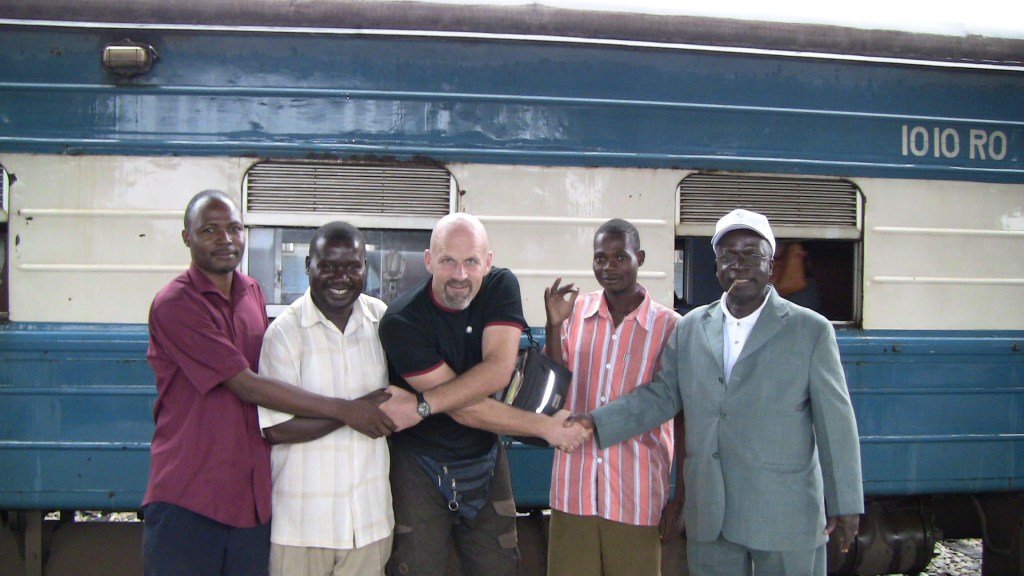

It was a man in my village – he had never spoken to me – who passed me, and suddenly said: “I bought you last week, you were very good, and I sold you again, but now I bought you again.”
And I said: “What?!”
He replied: “Do you know about the game?”
“No, tell me about it.”
So I thought he was probably the only man in Norway playing this, but then it started to grow very, very rapidly, because I was then becoming the marketing boss of a very good football club in Norway called Vålerenga.
I met a lot of celebrities in Oslo, our capital, and actually at my first big banquet with a lot of A-list and B-list celebrities. I sat down and was a little star-struck with all this, but I presented myself to someone across the table, and he said: “Are you THAT Bjørn Heidenstrøm??”
“What do you mean THAT Bjørn Heidenstrøm?”
“I play this game,” he said, “called Championship Manager.”
“Oh yeah! I’m in that-”
“You’re my legend!”
That kind of responses, and fun, and enjoyment, has for all these years, just been there. I think it’s every three or four months on Twitter I say: “I owe 100 beers to the programmers who fixed me into this game.” It’s been great fun – great fun.
Do you think you will ever get tired of this tag of being a Championship Manager legend? Is it something that you love?
Oh yeah, yeah – it’s 100% fun and enjoyment. I make new friends about it, and it’s a big laugh. I have friends who become really superstars; Ronny Johnsen of Manchester United… he won the treble with them… when we have a beer I say: “Yeah, you’ve won that, but have you seen my statistics in Championship Manager?” So I can kind of use it in a pub environment with mates and everything.

And maybe the most important thing is I have done a couple of expeditions where I have kind of used football as the glue, and it’s fantastic what can happen in strange, faraway countries if you just say Football, Championship Manager, and “I’m in that game”. I mean, you get friends in very strange places, which is important when you travel alone and dirty on a bicycle.
Bjørn, you mention those trips – I wouldn’t mind asking you about that next, because I’ve read one or two interviews – I think Dave Black did an interview with you about five years ago, which was the first one I saw, and he mentioned these trips that you took. Could you explain to us briefly what the main motivation was, and as I understand, the organisation – The Shirt – was a charity that you were raising awareness and funds for. Tell us how that came about, and what came of that?

I still think it’s interesting. I would like to do it again; I’ve done it three times now, three expeditions. It started with that I see football as the most fantastic friend-maker in the world, because I’m no celebrity in Norway, but saying just a couple of football names you can suddenly say in a pub: “OK, I’ve got friends.” Then I saw this great power when I worked as a marketing man in a big football club called Vålerenga, and we did a lot with anti-racism. We actually stopped racisms in part of Norway; there was racism, we went in, and we stopped it – because of football, and the power of football. We used our stars.
Then an organisation came to me in 2008, UNHCR [United Nations High Commissioner for Refugees] – that’s the biggest UN organisation for refugees – and they said: “We have 43 million refugees on the run, and we actually need people to speak about it. Because in 2008, we didn’t speak about it, and it was a big problem. They already said they will come over the oceans, people will drown. I said: “Well, I’m planning an expedition, and so let’s see what I can think about.
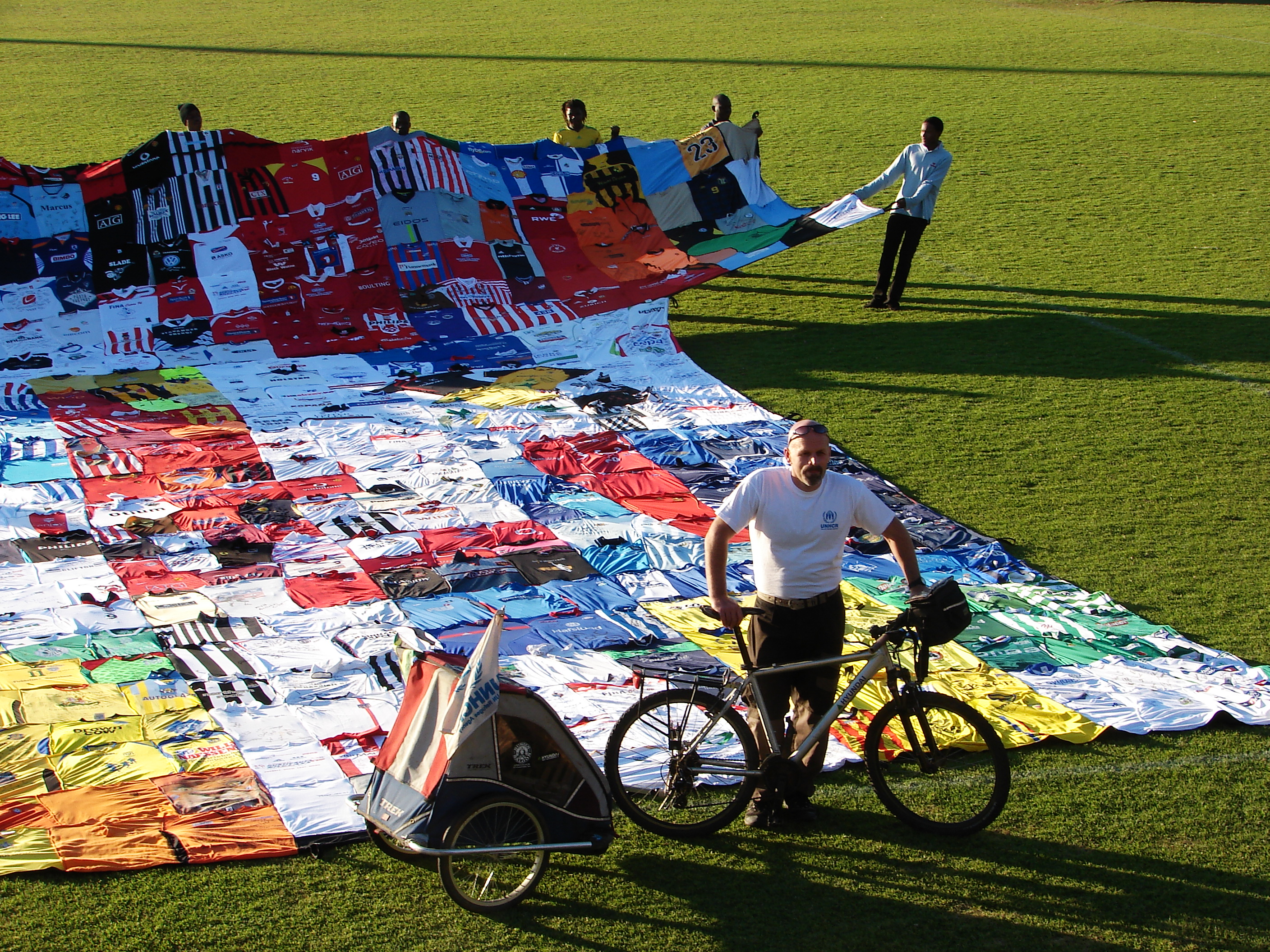

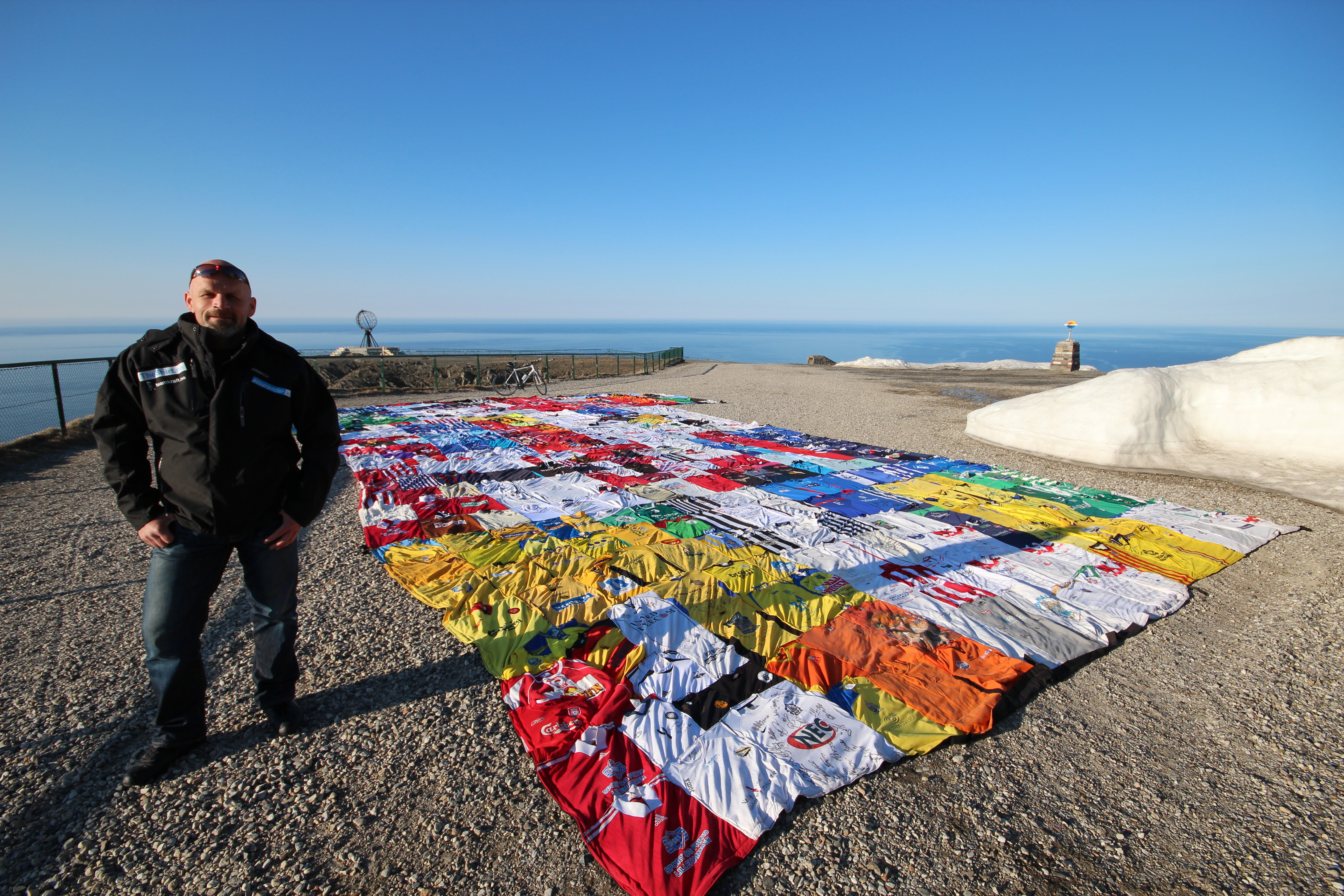
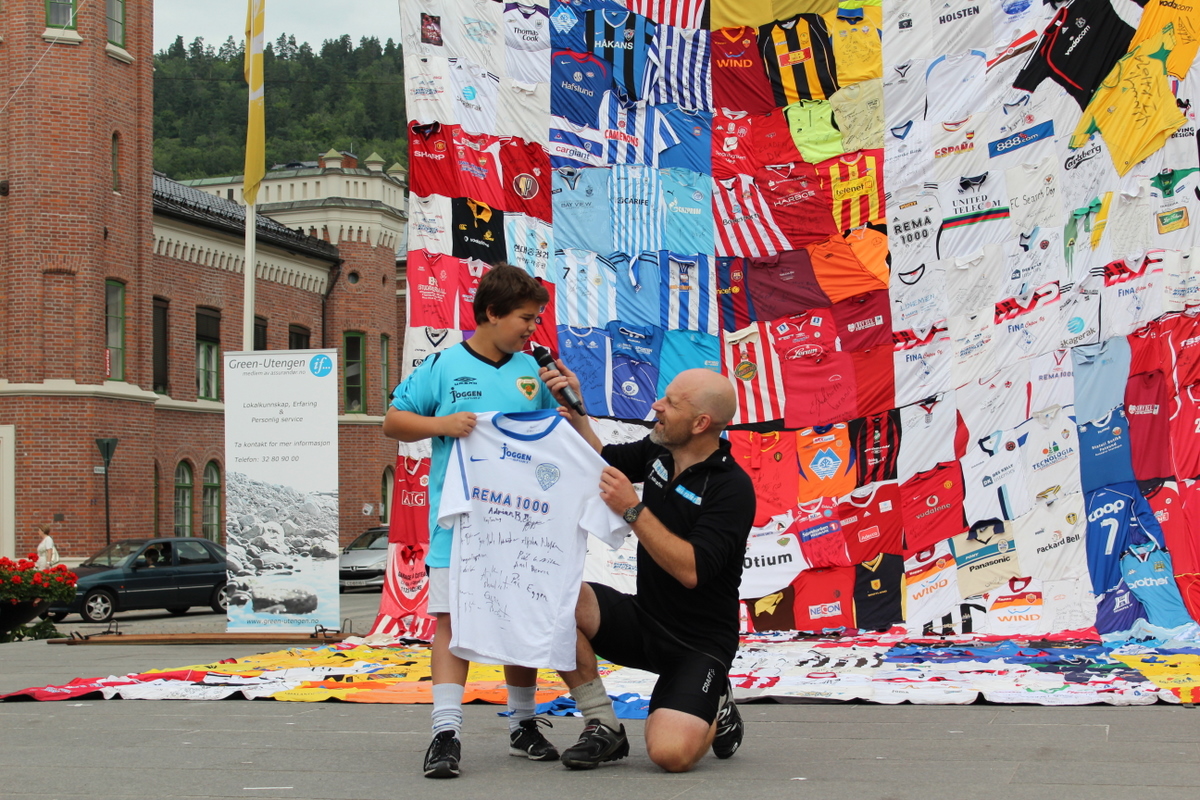



Then I sat at home, and thought – the strongest thing, for example you, Andrew, in football is of course the team you support. Then of course if you have a team you support, then you have a team that you… kind of hate, or that we pretend that we hate – until the day that you meet the supporters of that club in the pub, and you become aware that you’re part of the football family. We are all together; we are their friends. I wanted to use that. I said: “What if I take my Liverpool shirt, get it signed by players, and let me see if I can sew that together with a Manchester United shirt; let’s see if those two teams can agree that we need to help 43 million who are refugees.”
So then I knew, with my background, that I needed to have some drama, so i said: “OK, I’m cycling alone from Norway to the World Cup in South Africa in 2010, I’m going to get signed football shirts from supporters, fans, trainers, coaches, whoever, with the vision of making this enormous shirt. So I started to cycle – I’m not a cyclist… The first big, big headline – the whole paper – the headline was: “Mental Patient on Two Wheels”. That was about my expedition.
Going into Finland, the big papers said: “Hey, we want to make a piece on this: who are you, what are you doing.” So they made an article about 43 million [refugees] so it was like “Yeah!” The UN was like Yeah! the first article! Then I went into Russia, and the same thing happened. To make the very, very long story short, I arrived approximately one week before the World Cup. There were 621 collected signed shirts. That was from guys like you and me Andrew, and from a bit more famous players like the whole Barcelona, the whole Manchester United, Liverpool… and big football fans like Iron Maiden – the metal group, West Ham fans – so yeah…
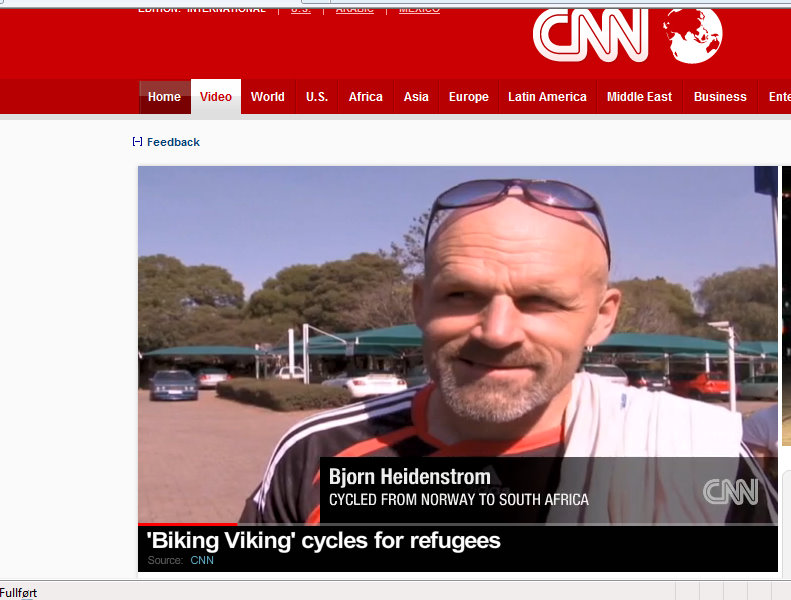


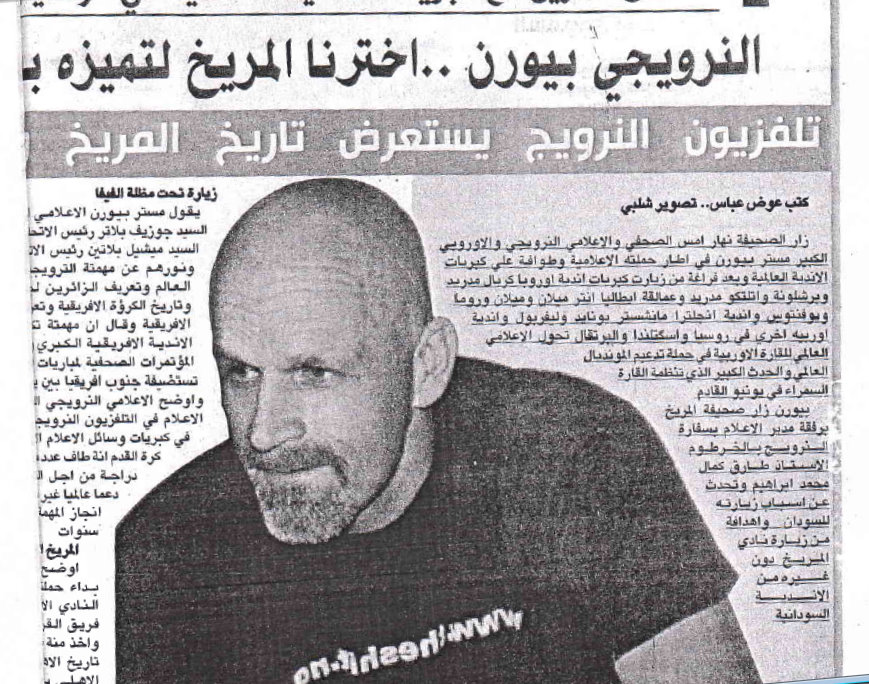
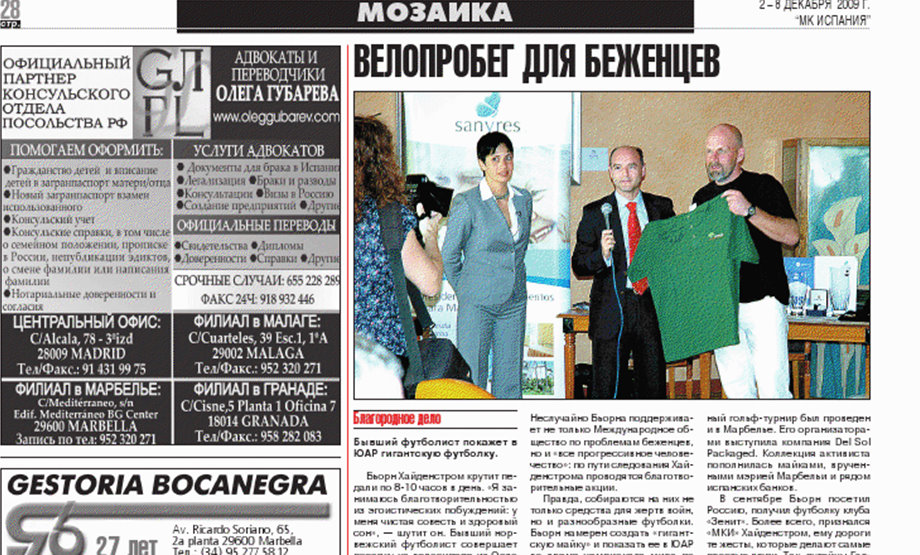
And at the end the UN was really, really happy because that trip, campaign, expedition made national headlines in 85 countries – because of football, and the football friendship. So it was a total boost of communication about 43 million refugees, with football fans around it – enormous success there. So I came home bankrupt, because I’d used all my money – but also with my bags full of stories. After a year of holding speeches, I was up and going in the end. I did it three more times, and I’m planning a new one now – if my wife Marianna allows me…

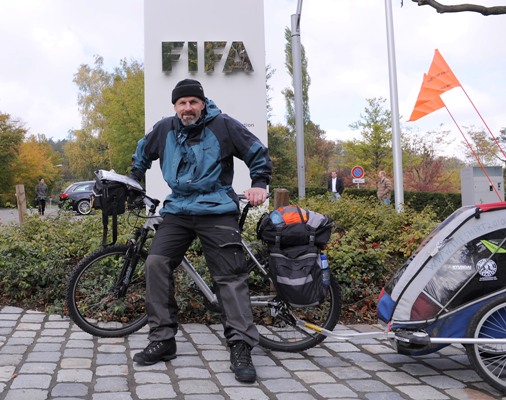
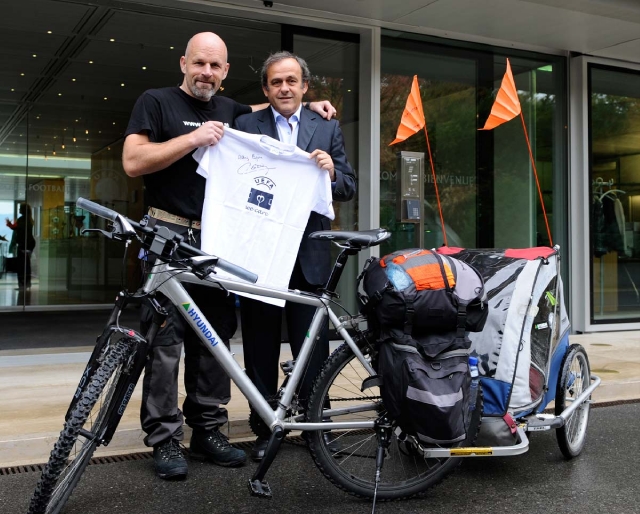


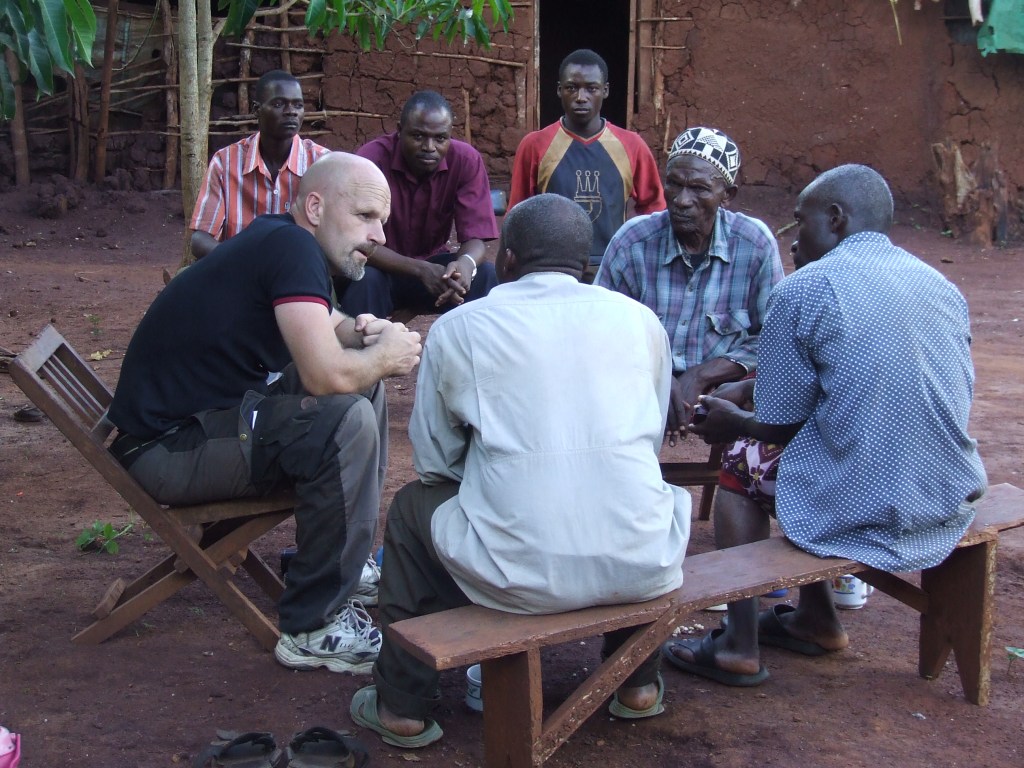

That’s quite some epic journey in many senses you’ve just described – my favourite part was you said you were bankrupt, but had a bag full of stories. I mean, that’s just my favourite part. Speaking of those memories that you have, Bjørn, if we could go back to your actual playing career as well, of course the key point that fascinates a lot of people is how on earth you came to play for Leyton Orient. As I understand, you took part in a 1,000th game for Peter Shilton. How did that come about in the first place, and what happened while you were at Leyton Orient, and why did you not stay longer?
Ha ha good question… It started with… on my football CV, it states ‘national youth player’, so doing well, a good talent, a good player who comes to the top in Norway, but quite early realised that Liverpool are not going to call me! So I started quite early to look at marketing and communications jobs. But, what happened was four or five years before that Peter Shilton legend’s 1,000 game, I was in Cambridge, I was at the training, and their manager Tommy Taylor liked me. Tommy Taylor gets to Leyton Orient, and their owner/promoter Barry Hearn – he is a marketing brain – so he looks at how Peter Shilton has 900-something games, and he knows that: “OK, if we buy Peter Shilton, he gets his 1,000th game here at Leyton Orient, Sky channel’s going to come.”

So that is what happens, but someone in midfield got hurt, I don’t know who, then Tommy Taylor says: “Hey, five years ago I was managing Cambridge, and a Norwegian guy was in training, he was good… Let’s see if we can rent him for this one game.” So he, Tommy Taylor, calls me, and I think, when I pick up the telephone, and he says what he says – Tommy Taylor, manager, playing for Peter Shilton’s 1,000th game, can you do it?” I actually 100% believe it’s a drunken friend who’s doing a prank call on me. So I say: “Very nice, Mr. Tommy Taylor; I need to call you back. What’s your number?” just to see if it’s a British telephone number. Then I look at it and think OK, it could be true…
So basically, Mr. Taylor asked me how much I would need to play this game, and I reply with: “How much do I have to pay you? Because I really, really want to play this game, with one of my legends, Peter Shilton! Well, I come over, I play this game, it goes well, and he asks if I can play three more. I have then a 100% marketing job in Norway, so I call my boss – who’s also my friend – to say: “Hey, I’m having a brilliant time in London with Leyton Orient, can I play three more games?” So I did that. Actually the deal was just to play that one game, and it was a good one.
As a bonus, there, I have to tell you Andrew, about when those English really made a practical joke that i think they still remember and talk about at Leyton Orient, because the third game is away against Swansea. I fell asleep on the bus; before you go over to Wales, there is this ordinary toll post you know, where you pay one pound, but they are looking at the Norwegian, saying: “OK, we can do something with that – he’s sleeping…” So they pulled over the bus on the hard shoulder before this toll, and everybody’s yelling and I’m now awake. The manager and the whole bus are like:
“Where’s you’re fucking passport?? Get you’re fucking passport!”
So I said: “Woah, what’s happening?”
“It’s the border to Wales here, all of us are English so we have a deal, you know Wales and England have a deal, but you are Norwegian, so where’s your passport? You have to hurry up because we’re going to have a dinner.”
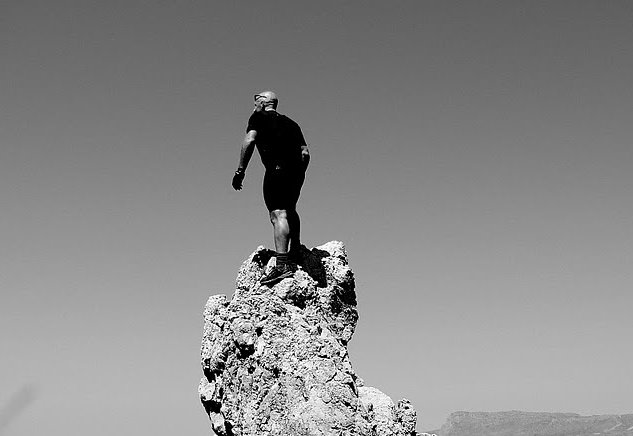
So I’m so stressed, and I luckily have my passport, so I run out of the bus, run 100 metres towards this lady, who is expecting one pound, but I say: “Hi, I am from Norway, this is my passport, all the others are from England, so can you please stamp that passport?” She starts to laugh of course, and then I turn slowly around and I see 45 English on the bus with that ‘national sign’ [showing me their middle finger] laughing their heads off.
I was there for three games, that was probably three weeks, and on the last day when I was saying goodbye to everybody, the lady who was cleaning the floor… Everybody was saying: “Ah, it was good to have you here, hope to see you again.” And the lady who was doing the floor, she said: “Excuse me! Excuse me, Mr. Heidenstrøm!” I said:”Yes, yes love?” “Have you got your passport, sir?”
Even the cleaning lady was in on the joke! As a player then, Bjørn, you had a great time at Leyton Orient, but in the game itself the statistics that were on your profile were… quite spectacular. I remember myself being manager of Leyton Orient many times, and it was you, and Alex Inglethorpe were in the game, and that was the best midfield; it was wonderful. But your stats in particular, the ones that I find most interesting – you had 20 for passing, 19 for shooting, but then you also had 18 for tackling and 17 for aggression. Now that tells me I’m not sure which character of player you were. Could you tell us, honestly: were you a more creative midfielder, or were you a brute enforcer in defence – what type of player actually were you?

I was a blend between Pele and Maradona… Ha ha ha, no I was not, I was not… No, those numbers, I’m so sorry to say, the numbers are maybe a bit wrong. I was actually, I was what you would call – I think you have this expression – a midfield terrier? This midfielder full of energy, who does all the runs, offensively and defensively, and always want to do something. I was a good tackler, always good at winning the ball…
My shooting was NOT good, not 19. I think my passing was good, was up there. I can’t rate them because i played here in Norway, but I guess if you placed me as a 19-year-old in England, maybe I would play in the English First Division [Championship] – not the Premier League, but the First Division – and I would probably play, if I did well, in the midfield in that role. I didn’t score that many as a midfielder, maybe two or three goals a season, but I was basically a central midfielder, very often the captain, very often full of energy and tackles, so that was me.
Was there a number for my speed as a player?
Yes, it was down as 16 for pace… so pretty speedy, Would you say speed, 16 for pace was accurate?
No! No, I think that’s the most wrong number there. But as I say I would raise the passing, the tackling, the heading and everything, but I think that’s the reason I didn’t take it to the next level because I did NOT have the speed.
That was actually my first meeting with.. do you remember Ronny Johnsen, at Manchester United?
Oh Ronny Johnsen? Yeah of course.
Yeah, he has Bolt, the Jamaican’s, speed. So I remember I played sometimes as a centre-back in some games, and the manager said: “They have a new striker.” Because Ronny Johnsen started his career as a striker. And then I asked, as always; “Is he fast?” He said: “No, no, no… really slow – like you Bjørn!” Then the first ball in the channel behind me, I had about 20 metres on Ronny Johnsen – and he went like Whoosh! behind me. So that was the level when it comes to speed…
That’s reassuring to know Bjørn, because when I, in my school playing career, I was a centre-back and central midfielder as well at times, and I also had very limited pace, so quality doesn’t need pace, we can both agree… I think that’s absolutely fine. Bjørn, I must ask you about another Championship Manager legend that everybody knows: Tommy Svindal Larsen. Now, as I understand, you played alongside him: could you tell us – you mentioned about your statistics, and you were, you know, very honest and said that perhaps some of the statistics weren’t quite as accurate – but would you say Tommy Svindal Larsen’s statistics were accurate? How good was he? What was it like playing with him?
I was playing for Odd Grenland, he came in very, very young, and he was, absolutely, a miracle – on everything. He came in too young, or we thought too young, but OK he’s good enough. Then his technique was… well, the best I’ve seen live. His passing and his magic, his balance to do the right decision in every moment was just… astonishing.
I remember asking Tommy in the first half:
“You get the ball, have you back to the other way, you have three people around you, and it’s something like abracadabra whoosh swoosh happens! Can you explain it?”
And he just said: “No, I can’t.”
I asked:”What kind of technique were you doing?”
“I don’t know.”
And that was his story: he was just this fantastic player with the technique and the balance. His passing was very good, and he was kind of player who was not fast over 100 metres, or over 40 metres, but he was deadly fast over three metres. He was like that! for the first three metres. So he came out with the ball from every situation and he really, really deserved to be a professional in Germany.
You know how it is when you’re at the pub, and you’re like: “What if he had been discovered in England, like five years before? What if Real Madrid did to Tommy what they did to Ødegaard, and bought him as a 15-year-old? What if? Because he absolutely had that talent to play for every team. He deserves every stat. I don’t know if his shooting is deadly, but all the other stats if they are really, really high he deserves that. And he’s really fun to meet, to be around, so… yeah, he’s a good fellow.
Well, two brilliant teammates, and I always had both of you in my sides, and that’s the absolute gospel truth I promise.
I’ll tell him that! I’ve also told him that he has to go and make a Twitter account and be on social media, because his life would be even more, happier, because I see all this talk about Tommy Svindal Larsen, so… that’s what I’d do. I think one day every year I have a bad day, and then I just Google myself in English and somebody writes: “He’s a legend!” and I go:”Yep! Yep! I am, thank you!” Then I’m happy again. So I’m really, really happy for Championship Manager, that’s for sure.
Speaking of statistics – well, we know how popular Championship Manager and Football Manager games have become, but in a broader sense, the – some people would call – obsession with numbers, and statistics, and data analysis in the modern game: do you think this is just a natural progression of football, or do you think it’s becoming too obsessive and people are losing sight of just watching the game, and understanding it better?
I like both aspects. The biggest reason for us Norwegians to love stats is that the only time Norway has been on the FIFA map was around ’94, when we had Egil ‘Drillo’ Olsen as manager. We were up there, we were ranked number four or five – because he used stats. He used statistics to… I don’t know the name of this baseball movie with Brad Pitt…
Moneyball?
Yeah, that’s it. If you take moneyball into Egil ‘Drillo’ Olsen’s head, you get that period for Norway when he was just cynical about facts. And that’s facts when it comes to – well, the most cynical was: “If Norway have seven passes,” he said (we didn’t do that, he said) “After seven passes, you can just give the ball to the opposite side, because the stats say that bla bla bla bla.” Then he started with Stig Inge Bjørnebye being the left back, we had Jostein Flo playing for Sheffield United on the right flank, then we had the terrible long ball that we used – because the stats show that if you do that poor pass up to their box, the chances of scoring goals are, you know…
So it was stats, stats, stats. The latest one that I really, really like – because I trained for my expedition, and I trained in my life, I always speak about when that manager, Mr. Olsen, used stats to get the head of a football player ready for information. By that, I mean every football player, when we have our football boots on, we are a bit stupid… and we also think, all of us, that we are a bit Maradona, Pele, George Best.
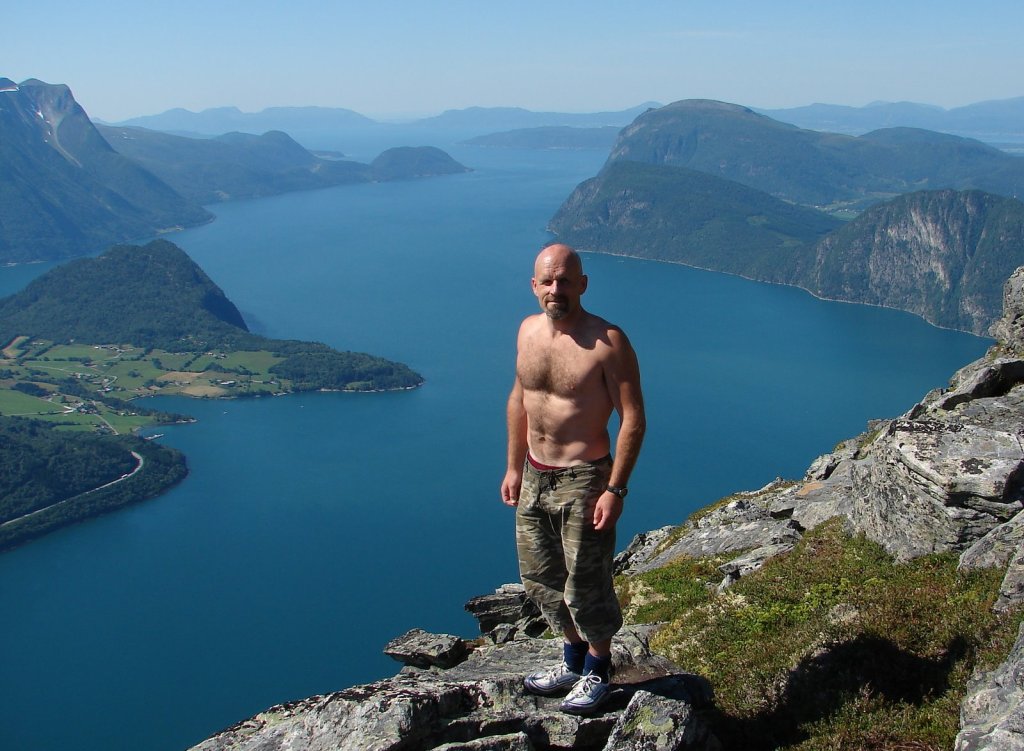
So he asked all the players there in ’94, all the players on the national team:
“Do you have the same stamina as the Italian national team?”
And the Norwegian football players said: “Yes, we have. of course, yes we have.”
“Well, that’s good, because they are rated as the best stamina in Europe; but let’s use some stats. Let’s test that; let’s check if what you say, if you are really right.”
So then they did that, and the tests showed that no, the Italians were far better when it comes to oxygen and all that. But then the Norwegian football players said: “OK, so we don’t have that stamina, but we run as much as them during a game.”
Olsen replied: “Let’s look at the stats.”
So he measured how long a Norwegian footballer was running, and compared it with the Italians, and he came back and said: “You are wrong again!” So when it comes also to training, I really like stats if you use it in the right way of course. That’s the most important sentence I think: if you use it the right way.
You mention the success that Egil Olsen oversaw in the rankings in the early 90s; what about the modern day Norwegian side? There are some genuine global superstars, or at least potential superstars, to represent the Norwegian national side. Erling Haaland stands out, but Martin Ødegaard was really… I remember when he signed for Real Madrid as a 15-year-old, I believe it was, and for a few years people said: “Well, his career may be destroyed because it’s too much too soon,” but he seems to be developing a lot more in the last few years. Do you think there’s a reason why this exact generation has not qualified for the World Cup, or achieved more, or do you believe it’s just a case of being patient and waiting for them to become more proficient at reaching major tournaments?
Very good question, and I believe in the last one – and I hope for that, because if you look at… you start with Erling Braut Haaland, he was just… you moved him from the farmland of Norway and then he was a superstar the day after – and that is very, very seldom. But if you look at Martin Ødegaard, he has the natural progression I think. Of course, when he was bought as a teenager to Real Madrid, everybody knew that it’s not going to happen. Then they rented him out, but they saw the talent, and it’s basically – for me – in the last two years that you see that kind of flower going up, and he’s going well now at Arsenal. He’s found his right club, he’s found his role, and he’s now starting to be that super-mature player.

For me, what I hope for, is the next three years from today that he can be one of the really good players in Europe. And the same with Haaland; he’s also there now, but he’s already a superstar. And I have to say, the manager Ståle Solbakken did very, very great. He is the best we have now. He is really, really good. I don’t know why he didn’t do it at Koln, and at Wolverhampton – he didn’t do it well – but all the other years at FC Copenhagen he’s been brilliant, so I have fingers crossed for this generation. We have to speak again one year from now, because i hope we’re not this team that… well, it didn’t happen, so I’m hoping for the next two years basically.
I think it’s going to be very exciting to see how it develops. Bjørn, one last thing i would love to touch on – and again, about the future and looking forward – you’ve mentioned before on some of your social media accounts that you were writing books, or planning to write books; what projects do you have to release books, for what purpose? And what other plans do you have, whether it’s more expeditions or journeys: what does the future hold for Bjørn Heidenstrøm?
It’s three-fold. My books started because I’m a lot in nature. I use nature for everything: for my training, for my social life with my kids, with my family. My first three books are then what i will call hiking/kayaking/ski books. So I take one destination, and I work with that destination for a year, and I release the book. It has been good with three books now; and then I started to look at a book I think you would like, because I started to work with two books now.





One of them is about motivation: you know, everyone’s speaking about motivation, and we always have the one on the stage talking… but I’m working on a book which is how I read 100 books about motivation, and this is the summarisation. So I’m basically reading 100 books now, but I’ve always been interested in the topics since I was 13/14 years old.
That is the one book; but the book that you’re going to like is a book I’m going to call ‘Professional’. So I’m a not known at all ex-professional in Norway with my three games for Leyton Orient, but I have on my cell phone approximately 40 guys who have been very good professionals. So it’s from Ronny Johnsen at Manchester United, it’s Liverpool, it’s Bohinen, it’s all over, and I’m going to ask them questions about – you know, the ones you and me had when we were seven/eight years old.
The first one is: How can I become a professional? How should I train, how should I eat, how should I think. So I’ve started with that project, and I hope that book can be two things: one is for the mother or father; for example: “Ronny, take us back to the time with Sir Alex, those games, tell me about Cantona, tell me about Giggs…” So that’s for the father or mother, or further down the history line.
But the other part of the conversation is, that mother of father have a son or a daughter who are thinking about: “I want to be a professional.” So, tell them now: how should they do that?
I’m also, for those really, really interested in football, I’m going to go deep into… do you say ‘nerd’? Is that very, very deep into…?
Well I guess sometimes it is even used in a positive sense nowadays, so yes.
So, for example, as a midfielder, I think I was 28 the first time I saw a player who said: “Bjørn, you’re never looking over your shoulder.”
I said: “What do you mean by that?”
It’s too late in my career when he said: “Well, here’s a video of Zidane, and he’s looking over his shoulder every second – he was playing on the field like this – and you’re looking over your shoulder like once every 15 minutes, so when you get the ball, you don’t know what’s behind you.”
I replied: “Well, you’re basically right…” So that’s just one thing I’d like to talk about in the book, these details.
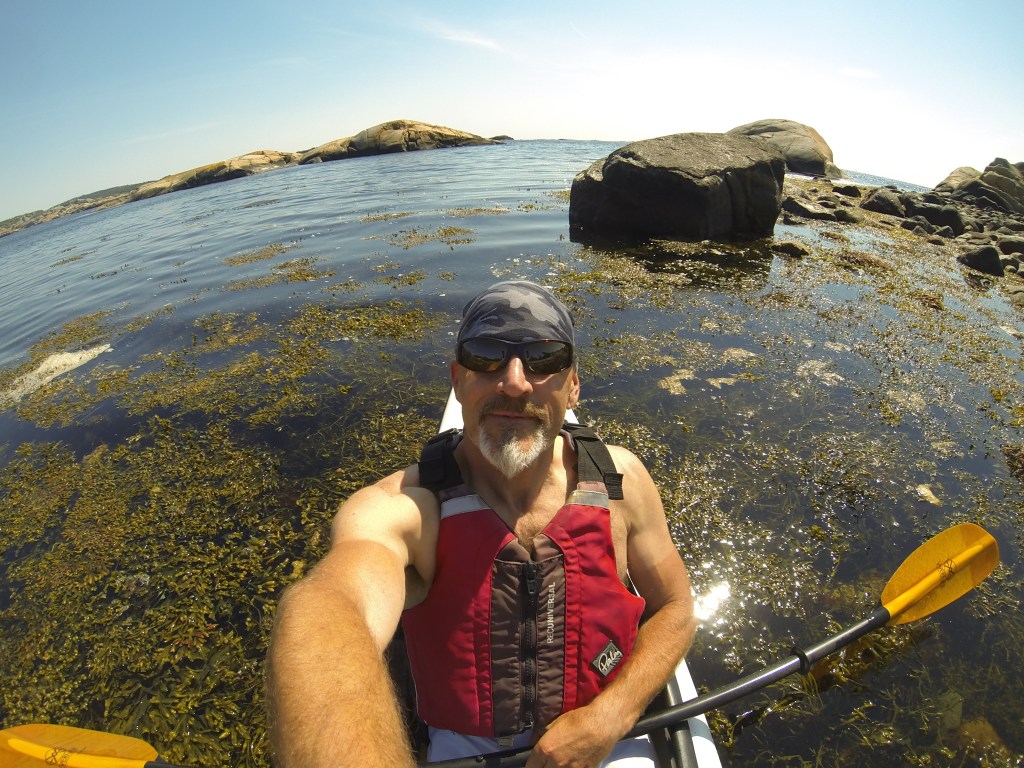
So that’s the book. Then I’m planning an expedition – my fourth one – because I think the pandemic is over, I hope so, and then I can do that again. Fingers crossed! This time I’m going to use my football friends again; I’m going to row from Norway to London. So alongside I’m going to put a highlight on pollution in the oceans. I work a lot with pollution in the ocean. I’ll do some research and try to get some new things on the table – hopefully in a funny way, and hopefully with new football friends.
Bjørn, it’s the most exciting journey, and it’s as if you’re never going to stop! You were saying earlier when we were setting up the call that: “I’m 100 years old, I’m not so good with technology…”, but I get the sense that you don’t need technology; you’ve got all the things that you need – you’ve got your football family, your expeditions, the outdoors; it sounds refreshing.
Thank you so, so much for your time. I really, really appreciate this. It’s been a fascinating insight into, well, I’m not going to sugar-coat it, you were a childhood hero of mine even though I had no idea about you, and you won me many trophies, so I appreciate that! It just goes to show that connections can lead from one thing to the next; and suddenly, you’re campaigning, writing books, and getting everything out of life. It’s just a wonderful story. Bjørn, thank you so much for your time, I really appreciate it, and hopefully we can speak to you soon to see how your projects are going.
Yeah, any time.
*Ad: Bjorn is Championship Manager royalty. We’d highly recommend ‘Football Manager Stole My Life‘


Leave a comment